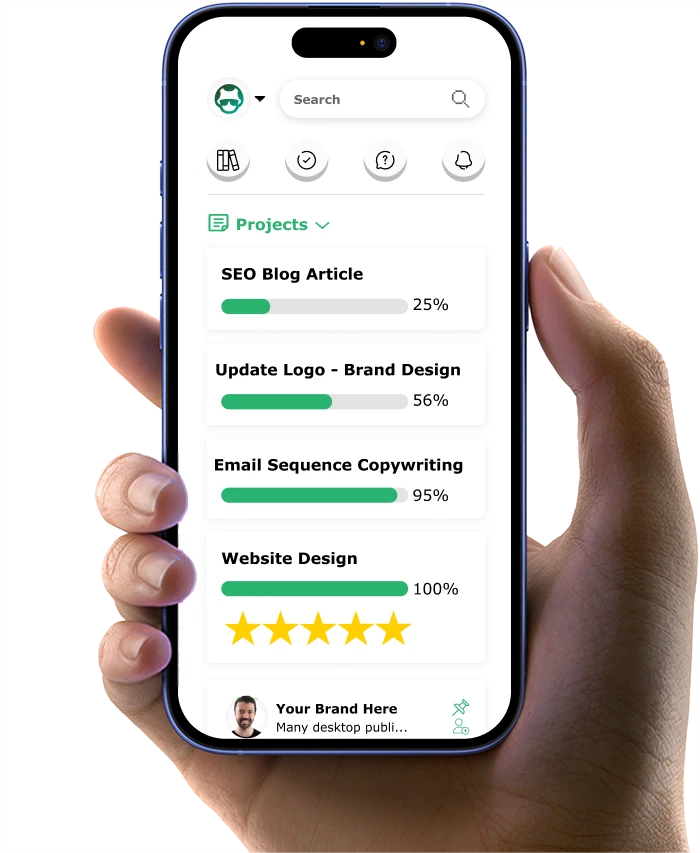Q&A Tuesday - How Do You Create Content & Find Research to Support It?
This is the first in what may turn into a weekly post where I give an indepth answer to one question from our blog readers. I will try to pick specific questions that also have broad appeal in terms of the answers being able to help the small business owners, entrepreneurs, and marketers in our audience.
This question is from Kelly Cammack of Apollo Answering Service in Houston, Texas.

In her question, she writes:
"My biggest marketing challenge is creating content. And finding research to support what I want to say. =/I have some tickets like 4 - 8 for Monday night's rodeo r.e.o. speedwagon (not quite sure how many yet) that I want to give away to some clients. I was thinking about sending out an email offering them to anyone who fills out a Google or Yelp review of our services. Do you think that is a reasonable exchange?"
Here's my answer:
Kelly, creating content is probably the single biggest challenge of any business who is looking to build a sales engine that drives a steady flow of customers.
Building a website, setting up an email marketing tool, and almost everything else that's part of the foundation of an online sales engine represents a one-time investment, and then there's some ongoing optimization and tweaking after that.
By comparison, when it comes to creating content, it's something you need to do consistently if you're truly going to benefit from it. Content is like the fuel that ignites and runs your sales engine. And the more fuel you have, the more benefit you get from your engine.
That being said here are your options for producing content:
- You can create the content yourself
- You can outsource the content creation process
- You can get your audience to help you create it
Let's deal with each in greater detail.
#1 - Create the content yourself
This method costs nothing but your time. But that's also the downside because one quality blog post should take a minimum of 3 hours of your time to create, and that doesn't include the time to promote it either.
Regardless, if you're able to get into a routine where you have time in your weekly schedule to commit to content creation, the next question is, how do you get started?
First, you'll want to focus on content ideas that are highly relevant to your target audience. We're not going to create content (blog posts, landing pages, offers like contests) just for fun, we need to be strategic. We want to create content that people read, share, and use as stepping stone to get onto our email list or inquire for more information about your services.
There are 3 ways to generate relevant content marketing ideas:
- SEO keyword research
- Look at competitors and other industry blogs
- Turn common questions into blog posts and landing pages
To generate ideas, start by looking at the low hanging fruit. Log into Google Webmaster tools and Google Analytics to see what keywords are driving the most number of people to click over to your website or blog.

For example, I noticed with Growbo that people are searching for keywords like "best sales funnel examples" and clicking over to a specific blog post on our website to read more.
This is highly relevant to the custom landing page and sales funnel design services we offer so it would wise of me to create another blog post around this topic in the future. That's one idea.
Another way to generate ideas for content that will attracts potential clients is to study your competitors and other top blogs in your industry.
For Apollo, since the service is local to the Houston, Texas area, you'll want to search for "Houston, TX answering service" (and variations of that) to explore what top ranking competitors are doing.
When I performed this search, I saw that the bar is set pretty low (as is the case with many local business industries on the web right now), but there was one competitor offering a downloadable white paper on how an answering service can help a business increase productivity by saving time. This is a content marketing tactic you may want to consider copying.
Since professional, time-saving customer service is basically what's being sold, you can also try searching for content ideas with key phrases like "how to answer the telephone professionally" or "customer service blog" or "customer service best practices." Consider subscribing to answering and customer service related blogs around the country where you find the content to be relevant and high quality.
Over time, as they produce more articles you'll have a chances to read them and you'll find yourself naturally thinking of or plucking out ideas for what your audience will be interested in reading.
You can read more details about how to implementing a regular content marketing process here, but the key to success is relevance, quality, and consistency.
To address the question of how to research to support what you're saying: this is also one of the reasons I recommend subscribing to top industry blogs or association newsletters. This allows you to link or directly quote from these credible third party sources.
Remember, research doesn't always mean some bit of information that must come from surveys compiled in white papers or experiments published by a university.
It's surprisingly easy to find research and quotes from reputable organizations and people simply by running a formulaic search on Google. Something like "[keyword phrase] + research / white paper" has regularly turns up results for me. For example, I recently ran a search to find statistics on email open rates. I searched, "email open rates by industry" and the third result was exactly what I needed.
In addition, because quoting people and statistics isn't always feasible, the second best way to support the ideas in your content is to give an example from your own experience. It can be hypothetical, but if you're able to illustrate your points from personal experience the ideas are that much more memorable and credible. Plus, people love stories.
( Note: If you're reading and wondering when I'm going to cover the giveaway idea Kelly asked about, you can read my answer to that part of her question at the end of this article in one of the side-notes.)
#2 - Outsource the content creation process
This option is often an easy choice for busy marketers and entrepreneurs assuming they have the budget for it.
If you choose this route but scrimp on your budget (e.g. < $75 per blog post), the content is going to be of poor quality, represent old rehashed, ideas , and generally speaking no one will care enough to read it.
To get truly high quality, well-researched, edited, and clearly written content for your blog, you should be willing to invest $300 - $500 per article. This makes sense to me because one quality article that's 2500+ words will easily take me a minimum of 8 hours to write, research, and edit.
So if you're not willing to spend that much, be very skeptical that you'll get a return on your on your investment.
Here are some quick tips for evaluating a person or firm you're considering to take over your content marketing efforts:
- Do they show a genuine interest in understanding your business, the culture, your ideas, and who you are as a person? This is important if they are going to try to formulate a tone of voice to write in that accurately represents your brand.
- Who else have they produced results for and what were the results in terms of traffic and leads generated?
- Read some of their past content, and not just the samples they present to you. Study it for typos, style, keyword usage (for SEO), and the organization of the content on the page.
- Ask them to describe their process for creating the content to you.
#3 - Get your audience to help create the content for you
I'm listing this option here more to help you think outside of the box and to show you what's possible for the long term.
If you're able to build an engaged, loyal audience through a content marketing strategy, you can consider recruiting people directly from that audience to guest post about relevant topics.
A more scalable alternative to this is to have multiple contributors per article. The way this works if you would have a single topic or question and then have 5 - 10 experts give an answer. The incentive for them is you provide exposure for them and their brand, along with a link back to their site.
As I said above though, this is a longer term type of strategy and one that only becomes possible after you've built a captive audience.
Side note: content marketing for a highly local product or service offer
Content marketing on a local level is a slightly different challenge than the norm (the norm being a business on the web who can service customers almost regardless of location).
Kelly's Apollo Answering Service is such a business (for the moment) because it has defined its target market to Houston, Texas area.
To compete effectively with this localized target market as our key constraint, I would recommend blogging OR crafting some kind of new landing page (resource, white paper, raffle, etc) twice a month with a heavy focus on local references, events, and Houston, TX culture.
They mindset trick here is to think of your company and it's inbound marketing strategy as a kind of local news resource, but with a focus on professional service businesses (Kelly's primary clientele) and customer service tips.
Taking this kind of angle will prompt other local news organizations, bloggers, and Twitter users to look to the Apollo blog as a reference.
And of course, within those blog posts you're also plugging (when appropriate) your own services and free offers. This also give Kelly plenty of room for her to have fun with the content creation strategy because is not just about creating "hardcore" productivity or customer-service related content that directly relates to the business. With this local strategy she can talk about other businesses and community happens, but still be "soft-promoting" Apollo since at the very least someone reading the posts will be on her website.
Site note - in response Kelly's question about a Yelp review incentive
I would say go for it, and make sure to measure and reflect on the results. In fact, writing a blog post about what you did to get more reviews could attract links from various places and attention from other local business owners.
For the long term though, assuming it produces a positive result, you should figure out a way to repeated execute this kind of marketing campaign so it's not a one-off kind of benefit.
For instance, think about the concept of creating "evergreen content," meaning content that is always relevant and you're always able to plug or promote it. It can be a resource, article, white paper, report, email course -- you get the idea.
The tickets you're offering customers for review are perishable, but creating a system whereby you can repeat this tactic again and again is potentially a significant competitive advantage.
Conclusion
Unless you have a budget to hire great talent or a team to create your content, don't outsource. Instead, start with a weekly routine and publish an article of at least 2,000 words every 2 weeks (on a consistent basis).
Have fun with it, and don't feel limited by the tactics recommended here. Always feel free to think outside the box.
The biggest takeaway for Apollo from this article is the local content marketing strategy I articulated above.
What other tips do you think are relevant here in Kelly's case?














